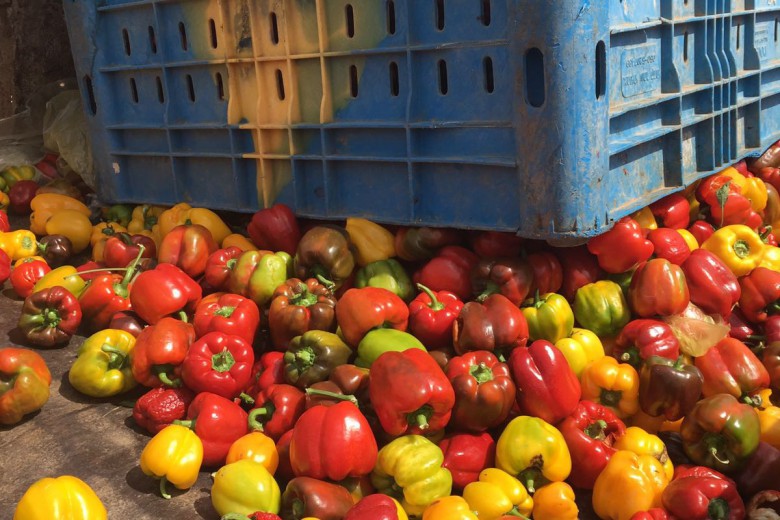On October 30, as dusk gathered on the soccer field at Toronto’s Dufferin Grove Park, hundreds of Jews and their allies congregated, holding candles and each other’s hands. They were mourning the loss of 11 people who were shot to death at the Tree of Life synagogue in Pittsburgh three days before. The vigil was hosted by the Toronto chapter of IfNotNow (INN), an organization working within North American Jewish communities to end support for Israel’s occupation of Palestine.
“For many of us, this moment triggers painful memories of our own experiences with antisemitism and stories passed down from our parents and grandparents,” said INN member Vlada Bilyak to the crowd, near the end of the vigil. “Our fear is real. And in these moments, it is easy to let our fear guide our actions. But we must remember that Jews have never been safe in the hands of white supremacy, and that white supremacy seeks to tear us apart.”
The Tree of Life synagogue shooting happened amid a climate of emboldened antisemitism across North America. In 2017 a rash of neo-Nazi posters was plastered across the campus of the University of Victoria, and in 2018 more explicit ones were found in Toronto’s St. Clair West neighbourhood. In October, the words “Jews Beware,” “Jewish Commies,” and several swastikas were found spray-painted on the Winchevsky Centre, a secular Jewish community space in Toronto that houses the United Jewish People’s Order (UJPO). And in November, four Jewish teenagers wearing kippahs and black fedoras (hats commonly worn by Orthodox Jewish men) were assaulted in Toronto.
“We know that safety will not come from more guns and police in our holy spaces.”
In 2017, reports of antisemitic hate crimes in Canada spiked by 60 per cent from the previous year – part of a swelling wave of hate crimes against Muslims, Black people, Asians, and LGBTQ+ people in the wake of Donald Trump’s election.
In a speech following the Pittsburgh shooting, Trump suggested, “If there were an armed guard inside the temple, they would have been able to stop him [the shooter].” But INN had other ideas.
“We know that safety will not come from more guns and police in our holy spaces,” Bilyak said at the vigil. “It will not come from cozying up to power, or building walls around our communities. Our liberation is bound up with the liberation of others, and our safety will come from building real coalitions and relationships of solidarity with Muslim communities, Indigenous peoples, racialized people, and so many others targeted by xenophobia and white supremacy.”
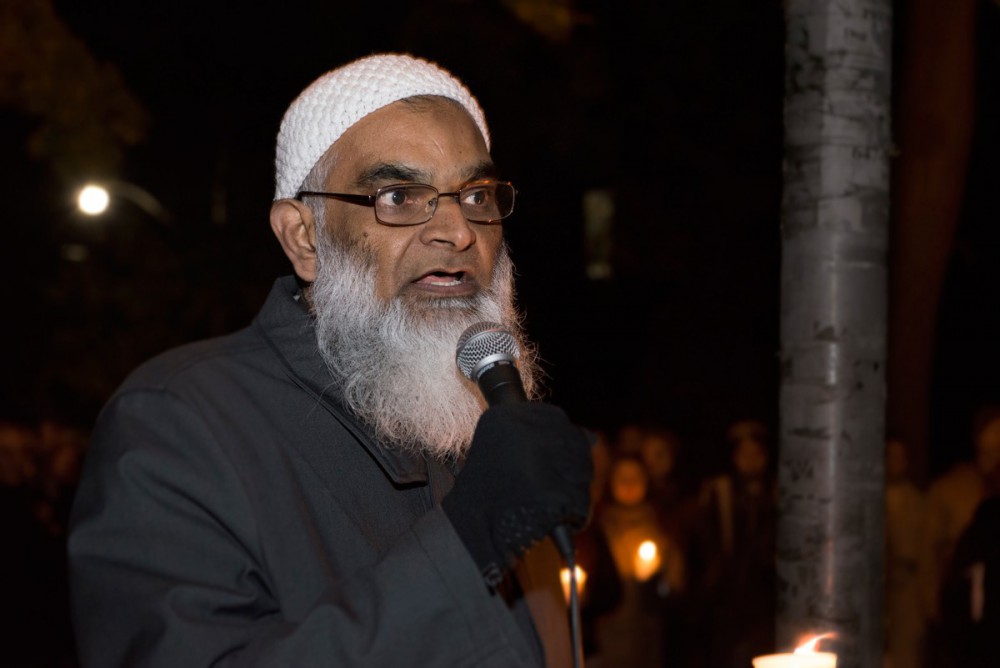
The landscape of the Jewish left
“Our liberation is bound up with the liberation of others” has become a rallying cry for young North American Jews who are fighting antisemitism while opposing Israel’s occupation of Palestine.
While antisemitic hate crimes increase in North America, there’s been a resurgence of the Jewish left – led by young people, rooted in solidarity with other marginalized communities, focused on ending the Israeli occupation, and held together by new articulations of Jewish community and ritual.
INN, which started in the U.S. during the 2014 war on Gaza (“Operation Protective Edge”), established its first Canadian chapter in Toronto in 2017. It added to the landscape of the Jewish anti-occupation movement in Canada, which already included the UJPO, a socialist organization with roots in the Jewish Labour League of the 1920s, and Independent Jewish Voices Canada (IJV), which started in 2008 and now has nearly a dozen chapters. Other anti-occupation Jewish groups in Canada include Canadian Friends of Rabbis for Human Rights, the New Israel Fund of Canada, Canadian Friends of Peace Now, and JSpaceCanada.
Each has a different strategy and target audience. Most of these organizations denounce Israel’s occupation of the West Bank, East Jerusalem, and Gaza, but stop short of opposing Zionism, the larger movement to maintain a Jewish state in the Middle East. Other than INN and IJV, most of these organizations are oriented toward a two-state solution where Israel remains a Jewish state – making them explicitly or implicitly Zionist.
INN, for example, “does not take a position on whether Israel should be a Jewish state, because not all members of IfNotNow agree on an answer to this question,” INN member Alex Langer explained in an op-ed in Haaretz. What INN does affirm is that Israel’s brutal military occupation must end, and the group is building a broad-tent movement that tries to change the public’s perception of Israel through social media and direct action.
“We have come to see that Zionism was a false and failed answer to the desperately real question many of our ancestors faced of how to protect Jewish lives from murderous antisemitism in Europe.”
IJV, while not explicitly anti-Zionist, consists mostly of anti-Zionist and non-Zionist members. IJV is active in the boycott, divestment, and sanctions (BDS) movement and pushed for a resolution at the 2018 NDP convention to ban products from illegal settlements being sold in Canada. It allies closely with the U.S.-based Jewish Voice for Peace (JVP), which recently declared itself anti-Zionist – making it one of the few Jewish organizations to do so. In their announcement JVP explained, “We have come to see that Zionism was a false and failed answer to the desperately real question many of our ancestors faced of how to protect Jewish lives from murderous antisemitism in Europe.”
Invoking Israel, ignoring antisemitism
Most Canadian Jewish institutions are pro-Israel – channelling money, shoring up Jewish community support, or downplaying the severity of the occupation. But this wasn’t always the case. Before the Second World War, the largest movements of North American Jews were non- or anti-Zionist. Major Jewish movements condemned the Zionist vision of a Jewish state in Palestine as religiously inappropriate or an impractical fantasy; others were simply more focused on building Jewish life in the diaspora. For example, the Reform movement of the 1800s – which today remains the largest school of Judaism that synagogues adhere to in the U.S., and the second-largest in Canada – insisted, until the late 1930s, that Jews should remain in diaspora.
In the early 20th century, Zionism was dwarfed by a massive Jewish labour movement that stood at the forefront of socialist struggle in Tsarist Russia and Eastern Europe (the Jewish Labour Bund), and industrial cities across North America. The movement was broadly inclined toward internationalism and ideologically opposed to political Zionism. This history of Jewish socialism and alternatives to Zionism has been all but erased within mainstream Jewish communities.
This was before the turning points of the Holocaust, the genocide which created hundreds of thousands of Jewish refugees with few countries that would accept them, and the Nakba in 1948, when over 700,000 Palestinians were driven from their homes to make way for the nascent Jewish state.
And that Jewish state is propped up by Canadian Jewish institutions. In 2017, IJV filed a complaint against the Jewish National Fund (JNF) of Canada, as part of its #StopJNFCanada campaign to revoke the JNF’s charitable status. The JNF had been using donations to fund the Israeli army’s infrastructure projects, in contravention of Canadian tax rules. It’s since triggered an audit of the JNF by the Canada Revenue Agency. The Toronto-based Beth Oloth Charitable Organization had its charitable status stripped in January for similar reasons.
“We can’t sit back and watch as the right exploits that trauma [in order to lead] our community down a path of endless occupation in Israel-Palestine, and fear and isolation across the diaspora.”
As Nora Barrows-Friedman explains in the Electronic Intifada, “After Israel’s establishment in 1948, the JNF took control of most of the land which had been confiscated from Palestinian refugees. In the 1950s, the JNF became a quasi-state organization, with a policy to lease land only to Jews on an openly discriminatory basis.” The JNF, best known for planting trees in Israel, also builds parks over the ruins of Palestinian villages destroyed in 1948, and conducts reforestation projects in occupied West Bank territory – ensuring that displaced Palestinians can never return to their former homes.
Today it seems inevitable, in any discussion of antisemitism, that Israel will be invoked. Jonathan Brown Gilbert, who co-founded INN-Toronto, tells me that the Jewish community’s support for the occupation is “bound up with a deeply felt sense of isolation and fear.”
Attacks against Jews in the diaspora are often used by right-wing Zionists to argue that a strong and militarized Israel is a necessary safe haven in a world that almost always has been, and will continue to be, hostile to Jews. But he adds, “We can’t sit back and watch as the right exploits that trauma [in order to lead] our community down a path of endless occupation in Israel-Palestine, and fear and isolation across the diaspora.”
Few non-Jewish leftists understand the depth and persistence of that intergenerational trauma. Nor do they understand that the history of antisemitism doesn’t begin and end with the Holocaust – Jews have been subject to regular bouts of displacement, discriminatory laws, forced conversions, synagogue burnings, and pogroms, like clockwork, for thousands of years.
As a result, non-Jewish leftists are notoriously bad at talking about antisemitism. A quick search of Briarpatch’s online archives will show that, in the last 10 years, this magazine has not published a single article that discusses antisemitism or Jewish life and culture in more than a cursory way.
It’s a blind spot that makes for frustrating and painful gaffes. In December, a Pomona College memorial for the victims of the Pittsburgh shooting that read, “Antisemitism Exists. Acknowledge It” was vandalized with graffiti saying, “Palestine exists. Acknowledge it.” Implying that all Jews are responsible for the state of Israel’s actions is antisemitic. Right-wing Zionists and the Israeli state itself deliberately push the narrative that Israel acts on behalf of all Jews everywhere. We can’t allow our allies on the left to parrot the same rhetoric.
More often, however, right-wing Zionists and their allies deliberately equate criticism of Israel with antisemitism, in an attempt to discredit Palestinian activists and their leftist allies. Fighting to distinguish between antisemitism and anti-Zionism comprises an enormous amount of the work that groups like INN and IJV do.
“We feel that our voices, those of leftist Jews, need to be heard. We are no less the victims of antisemitism.”
For example, in November, Justin Trudeau offered an official apology for the Canadian government’s failure in 1939 to admit a ship carrying 907 German Jews fleeing Nazi persecution. But he made sure to add, “Anti-Semitism is still far too present. […] Jewish students still feel unwelcomed and uncomfortable on some of our colleges and university campuses because of BDS-related intimidation. And out of our entire community of nations, it is Israel whose right to exist is most widely – and wrongly – questioned.”
The BDS movement, which grew out of a call from Palestinian civil society in 2005, has borne the brunt of spurious allegations of antisemitism. In response to Trudeau’s comments, IJV encouraged its supporters to send letters to Trudeau, telling him that the BDS movement should not be equated with antisemitic hate crimes.
Anti-Zionist and leftist Jews have to fight to be taken seriously in Jewish circles, including on the topic of antisemitism. In 2017, UJPO and IJV were denied spots on the Ontario Anti-Racism Directorate’s antisemitism committee, which was later disbanded by the Ford government in September 2018. “We feel that our voices, those of leftist Jews, need to be heard,” says Rachel Epstein, UJPO’s executive director. “We are no less the victims of antisemitism. We were not offered a place on the committee, which was made up of people from mainstream Jewish organizations.”
Safety in solidarity
When Darrah Teitel, a member of IJV, was planning a vigil for the Pittsburgh shooting victims in Ottawa, she made a point of inviting the entire Jewish community – even though IJV rarely collaborates with mainstream Jewish organizations because of their conflicting stances on Israel. The Tree of Life shooting was driven by “white supremacy and racism,” Teitel explains, so she felt it was inappropriate to make vigils about Israel – either to support or criticize it.
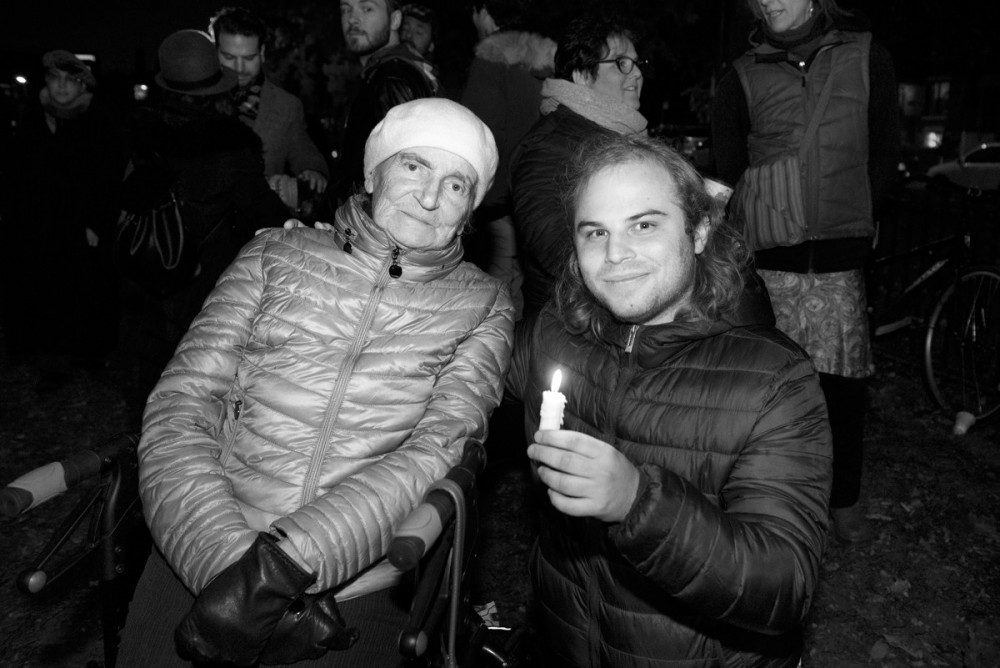
“We sent invitations to people in [the Jewish Federation of Ottawa] and all rabbis [from leading congregations in Ottawa],” Teitel says. “The next day we found out that [the Federation] was organizing a vigil at the same exact time.”
Per its website, Jewish Federations of Canada–United Israel Appeal of Canada Inc. is a charity that was founded as a “central body to manage fund transfers to Israel,” and works to connect Canadian Jews to Israel. It’s an umbrella organization that partners with the broader Jewish Federations of North America, which represents 148 Jewish federation chapters. The federations centralize decision-making about the distribution of community resources, and while federation leaders claim to speak on behalf of the entire Jewish community, far too often what they really represent are the political interests of their biggest and most conservative donors.
After the vigils happened, Teitel tells me she was upset to hear that Lisa MacLeod, Ontario’s minister responsible for immigration, was invited to speak at the Jewish Federation of Ottawa’s vigil.
“It’s one thing to have someone from Doug Ford’s government when they have done nothing but inflame and validate white supremacy,” Teitel says. “It’s another thing to have the minister [responsible for] immigration, who has literally been tweeting anti-immigrant rhetoric and has cut almost all of Ontario’s settlement money for refugees.”
On the same day as INN’s Toronto vigil, the CBC obtained an internal email from the Canada Border Services Agency, which outlined a plan to deport up to 35 per cent more migrants in 2019.
“The person who murdered all of these people at prayer did so because Jews were helping refugees into the States,” Teitel adds. “It’s sheer hypocrisy.”
A few hours before the massacre, the shooter at the Tree of Life synagogue had posted online, “HIAS likes to bring invaders in that kill our people. I can’t sit by and watch my people get slaughtered. Screw your optics, I’m going in.” HIAS, the Hebrew Immigrant Aid Society, was founded to help Jews fleeing pogroms in the Russian Empire, and today works on helping displaced people resettle in the U.S. and in refugee camps around the world.
“We’re going to respond to this fear and violence by pulling the ties that hold us in this struggle against white supremacy tighter.”
“It’s no coincidence that the Pittsburgh attack happened after weeks of Trump and others scapegoating [Jewish Hungarian billionaire] George Soros as the diabolical puppetmaster behind progressive Democrats, behind the Kavanaugh protests, behind the migrant caravan making its way north from Honduras,” Brown Gilbert notes.
INN’s Toronto vigil was endorsed by Jewish and non-Jewish groups alike, including UJPO, IJV, No One Is Illegal – Toronto, the Canadian Council of Muslim Women, Christian Peacemaker Teams, and the Urban Alliance on Race Relations. Brown Gilbert, who helped organize the vigil, explained that the diversity of groups helped send a message to the Jewish community that “other people have our backs.”
“For us, it was critical that we see this moment as a way that we come together,” explains Sterling Stutz, a co-founder of INN-Toronto who also organized the Toronto vigil. “That we’re going to respond to this fear and violence by pulling the ties that hold us in this struggle against white supremacy tighter because that’s how we’re going to be more safe.”
INN’s and IJV’s commitment to solidarity with communities of colour is influenced by the work of Jews for Racial & Economic Justice (JFREJ), a New York City-based organization that partners with other grassroots groups to build and win campaigns to end racial and economic oppression. JFREJ recently published “Understanding Antisemitism,” a resource for leftists hoping to understand antisemitism within the larger context of racial capitalism and colonialism. It’s particularly important to have organizations that connect Jewish safety to that of other communities targeted by white supremacy. Black and brown Jewish people are too often silenced, sidelined, or chased out of the Jewish community by racism from white Ashkenazi Jews, who understand themselves to be the norm of Jewishness.
“Historically, theologically, morally”
For many young Jews active in leftist movements, their activism is connected to cultural or spiritual practice – building Jewish life and community beyond Zionism, and investing proudly in the history, language, and culture of the Jewish diaspora.
“For me, there is no clear distinction between ‘left,’ ‘Jewish,’ and ‘organizing,’” Binya Koatz, a Bay Area INN organizer, tells me. “Our job as Jews is to pay back the eternal debt of our divinely secured freedom from slavery in Egypt by making others more free. We were brought out of bondage in order to serve the higher purposes of peace and justice.”
“These are not merely theoretical or conceptual turns-of-phrase; these are explicit commandments,” Koatz continues. “We aren’t commanded just to be peaceful and just, but to ‘chase after peace’ and ‘pursue justice.’ So my faith doesn’t serve as pretty, rhetorical window-dressing to my politics, but rather is the main thing that holds me accountable – historically, theologically, and morally – to a life of organizing my people, fighting injustice, and redistributing power in this world.”
Compared to the U.S., the infrastructure of the Jewish left in Canada is weak, but it’s beginning to grow stronger. INN and IJV regularly host inclusive, justice-oriented Shabbat dinners and Jewish holiday celebrations in Toronto and Montreal. IJV hosts a radical Jewish reading group on Saturdays called “Shabook Shalom,” where participants discuss texts about Jewish politics and culture, and mark the end of Shabbat with a Havdalah ritual.
“My faith doesn’t serve as pretty, rhetorical window-dressing to my politics, but rather is the main thing that holds me accountable – historically, theologically, and morally – to a life of organizing my people, fighting injustice, and redistributing power in this world.”
And young progressive Jews are increasingly choosing to learn Yiddish. While Modern Hebrew is the language of the state of Israel and is now dominant in Jewish education around the world, leftists are attracted to Yiddish for its diaspora history and the wealth of secular, socialist, and otherwise non-Zionist culture that comes with it.
Plus, in recent years, there’s been a wellspring of leftist media by and for young Jews. Protocols, a magazine launched in 2018, publishes long-form writing and art with a strong left, queer, and anti-colonial analysis. Jewish Currents has recently reinvented itself, transforming from a dusty holdout of the old secular Jewish left to a rapidly growing publication with a young editorial collective. Sam Bick and David Zinman have been running the TREYF podcast (Treyf means “unkosher” in Yiddish) on the community radio station at McGill University since 2015. With a following that extends south of the border, they interview Jewish and non-Jewish writers and activists from across the left on Palestine, whiteness, and every other topic too taboo for mainstream Jewish media.
All of these efforts – from Pittsburgh vigils that call out white supremacy to queer Shabbat services – are challenging the mainstream idea of what it means to be Jewish. They’re attracting young Jews who are looking for communities in which they can embrace their Jewish identity without having to stomach unquestioning support for Israel as a litmus test for belonging.
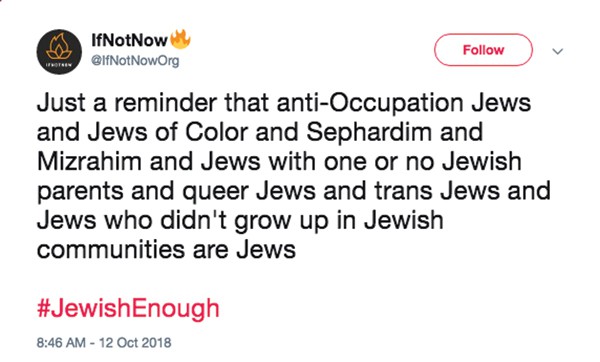
This is the project of INN’s #JewishEnough campaign, which explores intersectionality within the Jewish community. Brown Gilbert explains that the campaign “is meant to give voice to the many people within the Jewish community who’ve experienced the exclusionary [and] border-policing patterns of Jewish institutions. Many of us have been made to feel unwelcome on the basis of ‘not being Jewish enough,’ or Jewishness being set up in a false tension with things like having a non-Jewish parent or partner, or being queer or Black or brown.”
The campaign builds on the rhetoric of JVP’s #ReturnTheBirthright campaign and INN’s #NotJustAFreeTrip campaign, which challenge Taglit-Birthright, an organization that gives young Jews a free tour of Israel full of pro-occupation propaganda, reinforcing their supposed “birthright” to occupied Palestinian land.
“Institutions like Birthright exercise a kind of conditional belonging where people on the margins of Jewish communities are told that they are Jewish, and that no one will ever question their Jewishness again, as long as they commit to becoming uncritical supporters and defenders of Israel. And further, that that commitment is the same thing as being Jewish and belonging in Jewish community,” Brown Gilbert continues. “We’re fighting back and showing […] that there are other ways to be Jewish, that are way better. Most of us grew up with a really limited sense of what was possible, with no idea of the movements that came before us. Now we’re rebuilding the infrastructure of the Canadian Jewish left.”
(Disclosure: Brown Gilbert is the partner of Briarpatch’s current editor, Saima Desai.)


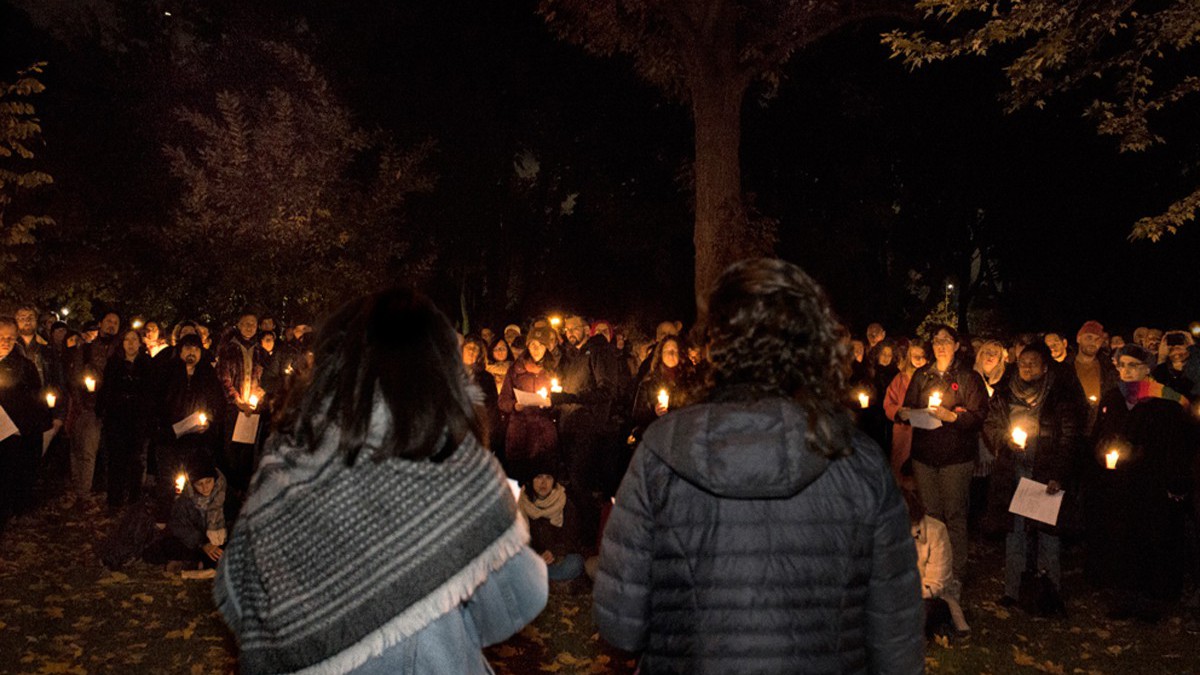

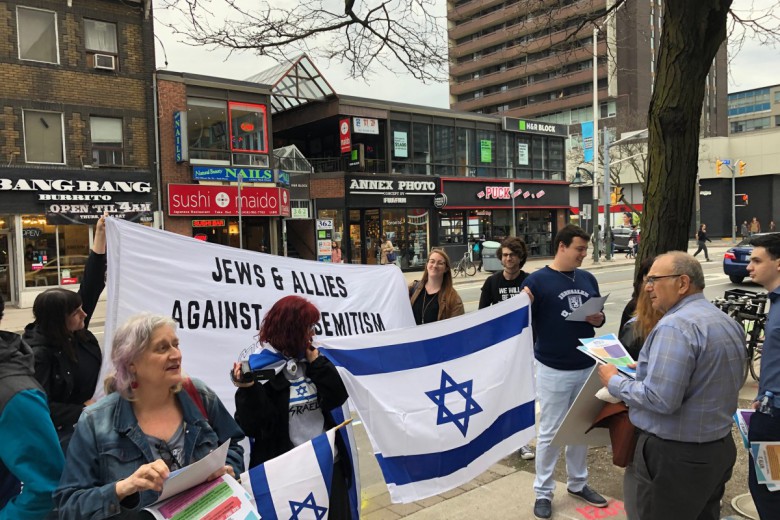
_780_520_90_s_c1.jpg)
